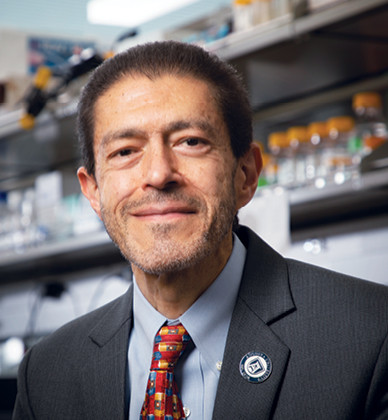Jorge Cortes, M.D.
Myeloid Leukemia
Augusta University
Recruited: 2019
One of the world’s leading leukemia experts, Jorge Cortes led the development of several drugs that are now key treatments for chronic myeloid leukemia. Because of his work, patients who are diagnosed with this disease can now expect better outcomes and longer lives.
Myeloid leukemia is a type of cancer that begins when a mutation causes too many white blood cells to be produced in the bone marrow. Acute myeloid leukemia (AML) spreads rapidly; chronic myeloid leukemia (CML) tends to progress more slowly but can become acute if not adequately controlled by therapy.
Historically, the prognosis for these forms of leukemia was poor: People with CML were expected to survive just a few years, and for those with AML, only a few months. As a clinical investigator, Cortes works on therapies for both types. His work focuses on creating more targeted, effective therapies with fewer side effects than conventional treatments.
That work reflects a paradigm shift in how clinicians now approach cancer treatment. The conventional method of chemotherapy, with its debilitating side effects, is being supplemented and replaced with targeted drugs that mount precise attacks on specific molecular changes in the cancer cells. This precision approach is made possible by advances in fundamental research that have helped characterize the individual gene abnormalities that lead to leukemia and other cancers.
Cortes has developed several FDA-approved drugs of a type known as a tyrosine kinase inhibitors. Tyrosine kinase inhibitors block the enzymes that send growth signals to cells. Without those growth signals, the cancer cells stop spreading and eventually die. Over time, leukemia cells may develop resistance to these drugs, so the need for new and more potent tyrosine kinase inhibitors continues. Cortes has continued looking for newer generation inhibitors that can help patients for whom other drugs have stopped working — or have not worked at all.
Another drug that Cortes developed, called omacetaxine, is now prescribed for CML patients if tyrosine kinase inhibitors have stopped working.
As of 2020, Cortes is at work on a drug designed to inhibit a mutated gene that causes fast-spreading AML called IDH1. This drug would block the function of the mutated gene only; if the gene isn’t mutated, the drug has no effect. This precise targeting means the drug produces few, if any, side effects. His early results are promising.
Cortes is also interested in the big picture for leukemia treatment. Improved therapies are just one piece; an approach that works for one patient may not work for another. Guided by both advances in basic research and improvements to diagnostic technology, clinicians like Cortes are finding it easier to identify the particular molecular abnormalities in each case of the disease and choose the most effective drug approach — often a combination of targeted therapies. In the end, the goal is to help more patients recover fully enough to end their treatment.
As director of the Georgia Cancer Center at Augusta University, Cortes is excited about the opportunity to bring the latest clinical research to patients here in Georgia, giving more under-served Georgians access to clinical trials and groundbreaking treatments.
Research
- Developing next-generation tyrosine kinase inhibitors to treat chronic myeloid leukemia
- Reducing toxicity and side effects of cancer therapies
- Activating the immune system to fight leukemia
- Improving quality of life for patients with leukemia
Straight from the Scholar
“One area of my research is exploring the impact that being far away from a cancer center can have on a patient with chronic myeloid leukemia. So many patients don’t have access to these types of approaches to treatment. It’s terrible to see, because patients who can access these therapies do great, but many cannot. So I wanted to see if I can do something about that, and that will be a focus of my work here at the Georgia Cancer Center.”

